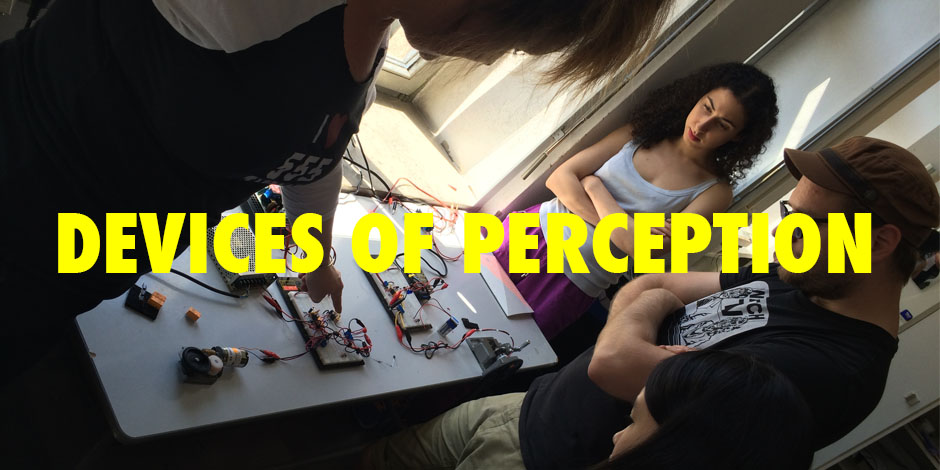No edit summary |
No edit summary |
||
| (39 intermediate revisions by the same user not shown) | |||
| Line 1: | Line 1: | ||
[[File: | [[File:wsedig_dop_COVERIMAGE.jpg|940px]] | ||
''' | '''Friday, June 6, 2014''' | ||
''' | The gallery below contains pages from my sketchbook filled during day one of Devices of Perception. They include course grading breakdown, several references to electromechanical artists, our basic parts list, an introduction to symbols, and several basic circuits. | ||
<gallery> | |||
File:wsedig_dop_6-6_sb1.jpg|Sketchbook Pages 1-2 | |||
File:wsedig_dop_6-6_sb2.jpg|Sketchbook Pages 3-4 | |||
File:wsedig_dop_6-6_sb3.jpg|Sketchbook Pages 5-6 | |||
</gallery> | |||
The video below shows the function of the second circuit we assembled: three LEDs in series. | |||
<videoflash type=vimeo>97731502|430|240</videoflash> | |||
The four videos below demonstrate the operation of the astable 555 timer, each uses a different capacitor resulting in varied on/off timing. | |||
<videoflash type=vimeo>97731511|430|240</videoflash> | |||
<videoflash type=vimeo>97731506|430|240</videoflash> | |||
<videoflash type=vimeo>97731504|430|240</videoflash> | |||
<videoflash type=vimeo>97731510|430|240</videoflash> | |||
When attached to a speaker the astable 555 timer can produce a beat for making sweet, sweet music. | |||
<videoflash type=vimeo>97761302|430|240</videoflash> | |||
'''Saturday, June 7, 2014''' | |||
The gallery below contains pages from my sketchbook filled during day two. They include an ink conductivity test, the diagram for the monostable 555 timer, and some notes on switches. | |||
<gallery> | |||
File:wsedig_dop_6-7_sb1.jpg|Sketchbook Pages 7-8 | |||
File:wsedig_dop_6-8_sb1.jpg|Sketchbook Pages 9-10 | |||
</gallery> | |||
The video below demonstrates the operation of a monostable 555 timer with a 4.7uF capacitor and a 1 Mega-ohm resistor. | |||
<videoflash type=vimeo>97761304|430|240</videoflash> | |||
'''Sunday, June 8, 2014''' | |||
The gallery below contains pages from my sketchbook filled during day three. They include an introduction to the first homework assignment, a few video references, the diagram for an H-Bridge, and a sneak peek at some project thoughts. | |||
<gallery> | |||
File:wsedig_dop_6-8_sb1.jpg|Sketchbook Pages 9-10 | |||
File:wsedig_dop_6-8_sb2.jpg|Sketchbook Pages 11-12 | |||
</gallery> | |||
'''Assignment 1: Lady and the Tramp''' | |||
Tired of eating alone? Does it make you sad? "Lady and the Tramp" doesn't solve your problems, but it does help you wallow in self-pity. When you pick up your silverware to start eating, romantic music plays and a black and white video of yourself keeps you company, or at least lets you watch yourself crying into your frozen lasagna. | |||
<videoflash type=vimeo>98734649|430|240</videoflash> | |||
The diagrams in the gallery below show how it works, so anyone can put it together and salt their lonely food with their own lonely tears. | |||
<gallery> | <gallery> | ||
File: | File:lady_and_the_tramp_parts_diagram.jpg|Parts Diagram | ||
File:lady_and_the_tramp_circuit_diagram.jpg|Circuit Diagram | |||
</gallery> | |||
'''Friday, June 20, 2014''' | |||
The gallery below contains pages from my sketchbook filled during day four. They contain some presentation notes, an introduction to the 4017 integrated circuit, and a diagram of a decade counter. | |||
<gallery> | <gallery> | ||
File:wsedig_dop_6-20_sb1.jpg|Sketchbook Pages 9-10 | |||
File:wsedig_dop_6-20_sb2.jpg|Sketchbook Pages 11-12 | |||
</gallery> | |||
The video below shows the working decade counter. | |||
<videoflash type=vimeo>98734648|430|240</videoflash> | |||
The video below shows the working century counter. | |||
<videoflash type=vimeo>98734647|430|240</videoflash> | |||
Latest revision as of 15:18, 20 June 2014
Friday, June 6, 2014
The gallery below contains pages from my sketchbook filled during day one of Devices of Perception. They include course grading breakdown, several references to electromechanical artists, our basic parts list, an introduction to symbols, and several basic circuits.
The video below shows the function of the second circuit we assembled: three LEDs in series. <videoflash type=vimeo>97731502|430|240</videoflash>
The four videos below demonstrate the operation of the astable 555 timer, each uses a different capacitor resulting in varied on/off timing.
<videoflash type=vimeo>97731511|430|240</videoflash>
<videoflash type=vimeo>97731506|430|240</videoflash>
<videoflash type=vimeo>97731504|430|240</videoflash>
<videoflash type=vimeo>97731510|430|240</videoflash>
When attached to a speaker the astable 555 timer can produce a beat for making sweet, sweet music.
<videoflash type=vimeo>97761302|430|240</videoflash>
Saturday, June 7, 2014
The gallery below contains pages from my sketchbook filled during day two. They include an ink conductivity test, the diagram for the monostable 555 timer, and some notes on switches.
The video below demonstrates the operation of a monostable 555 timer with a 4.7uF capacitor and a 1 Mega-ohm resistor. <videoflash type=vimeo>97761304|430|240</videoflash>
Sunday, June 8, 2014
The gallery below contains pages from my sketchbook filled during day three. They include an introduction to the first homework assignment, a few video references, the diagram for an H-Bridge, and a sneak peek at some project thoughts.
Assignment 1: Lady and the Tramp
Tired of eating alone? Does it make you sad? "Lady and the Tramp" doesn't solve your problems, but it does help you wallow in self-pity. When you pick up your silverware to start eating, romantic music plays and a black and white video of yourself keeps you company, or at least lets you watch yourself crying into your frozen lasagna.
<videoflash type=vimeo>98734649|430|240</videoflash>
The diagrams in the gallery below show how it works, so anyone can put it together and salt their lonely food with their own lonely tears.
Friday, June 20, 2014
The gallery below contains pages from my sketchbook filled during day four. They contain some presentation notes, an introduction to the 4017 integrated circuit, and a diagram of a decade counter.
The video below shows the working decade counter.
<videoflash type=vimeo>98734648|430|240</videoflash>
The video below shows the working century counter.
<videoflash type=vimeo>98734647|430|240</videoflash>










